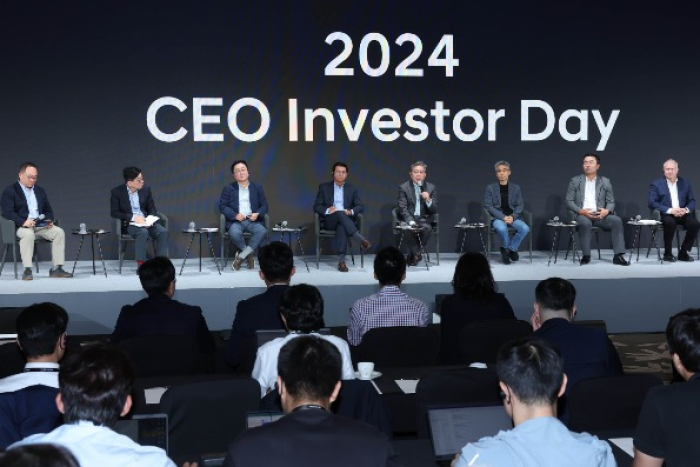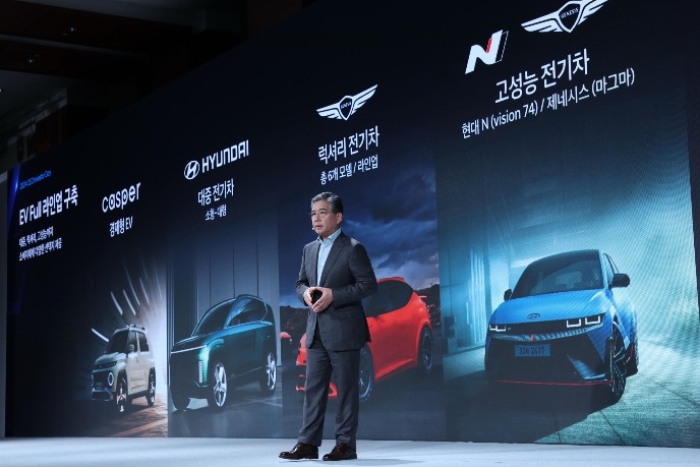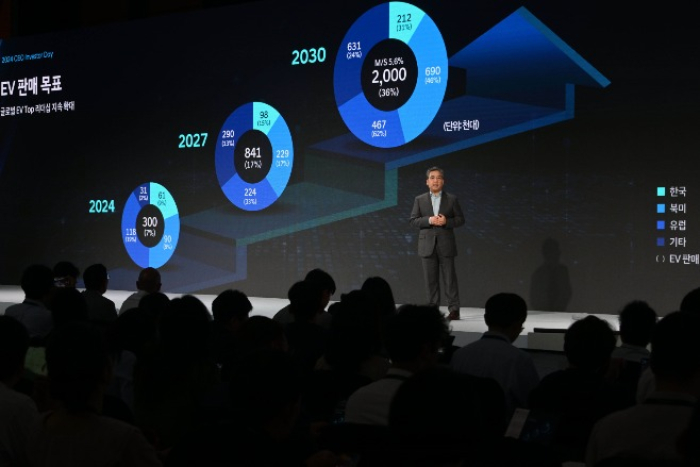Hyundai zeroes in on hybrid cars, longer-range EVs
It is sticking to its 2030 EV sales target of 2 million units, about one-third its total sales goal in the same year
By Aug 28, 2024 (Gmt+09:00)
LG Chem to sell water filter business to Glenwood PE for $692 million


KT&G eyes overseas M&A after rejecting activist fund's offer


Kyobo Life poised to buy Japan’s SBI Group-owned savings bank


StockX in merger talks with Naver’s online reseller Kream


Meritz backs half of ex-manager’s $210 mn hedge fund



Hyundai Motor Co. will double its hybrid vehicle lineup to 14 models and develop longer-range electric vehicles to overcome a prolonged slowdown or even a chasm in EV demand, said its Chief Executive Chang Jae-hoon on Wednesday.
To develop hybrid models and advanced EV powertrains, the South Korean carmaker will spend 92.7 trillion won ($69 billion) in the sectors through 2034.
That represents 77% of its investment of 120.5 trillion won earmarked for the next decade, compared with its 2023-2032 spending plan of 109.4 trillion won unveiled last year.
South Korea's largest carmaker, a sibling of Kia Corp., will roll out hybrid variants for 14 models, including subcompact, full-size cars and luxury models. Currently, it applies hybrid engines to seven models, primarily subcompact and mid-sized ones.
In February, The Korea Economic Daily exclusively reported that Hyundai would likely release hybrid cars under its premium brand Genesis in 2025, including its popular models of the G80 sedan and the GV70 SUV.
Hyundai's hybrid cars, to be mass-produced from next year, will fit in with the next-generation hybrid systems (TMED-II), Chang said at the company’s 2024 CEO Investor Day forum on Wednesday.
TMED is Hyundai's proprietary technology. Its second-generation model significantly improves the performance and fuel efficiency of its predecessor (TMED), but without raising the price.
To boost its hybrid car output, it will use its EV-dedicated plant in the US state of Georgia to manufacture hybrid cars to meet US demand once it comes online in the fourth quarter of this year.
Hyundai is targeting 1.33 million units of hybrid car sales in 2028, a 40% increase from its sales in 2023.

RANGE EXTENDER FOR GENESIS EVs
Hyundai is also developing extended-range EVs (EREVs), including for mid-size SUVs under the Genesis brand. It targets 80,000-unit sales for Genesis EREVs annually.
EREVs refer to EVs with next-generation powertrains. They run on gasoline and can travel more than 900 km. Hyundai will begin their mass production in North America and China in 2026 for launch in 2027.
Earlier this month, The Korea Economic Daily exclusively reported that Hyundai is developing a next-generation powertrain, known as a range extender, for pickup trucks and sport utility vehicles.
At the annual CEO investor day forum, Hyundai shared the plan to develop low-nickel batteries by 2030 and embed them into EVs. The price of nickel-cobalt-manganese (NCM) batteries has been on the rise due to the surge in nickel prices.
It is seeking to internalize battery technology, including for all-solid-state batteries to improve EV performance and cost competitiveness.

SALES GOALS, DIVIDEND POLICY
Despite the slow EV uptake, Hyundai stuck to its 2030 EV sales target of 2 million units.
That is equivalent to around one-third of its sales goal of 5.55 million units for all types of vehicles for the same year. The figure is 30% higher than last year’s sales volume of 4.21 million units.
Combining Kia’s 2030 sales target of 4.3 million units, Hyundai Motor Group is expected to achieve nearly 10 million units in global sales by 2030.
Starting in 2025, Hyundai will return 35% or more of its net profit to shareholders in dividend or treasury stock retirement annually, Chang said at the forum. That is about 10 percentage points higher than its total shareholder return in 2023.
Under the plan, the company will retire about 4 trillion won worth of treasury stock for the next three years, starting in 2025. It aims to increase its return on equity to 11-12% by 2025-2027 from the current 9-10%.
“Responding to market demand in an agile and flexible manner, we will create a new future centered on the two pillars: mobility and energy,” Chang said in the forum. “Hyundai Motor will expand into various mobility areas beyond automobile manufacturing to strengthen its position as a game changer.”
By building a hydrogen ecosystem, it aims to achieve zero emissions across the life cycle of cars, from production to driving and eventually to scrapping, by 2045.
Write to Jae-Fu Kim and Jin-Won Kim at hu@hankyung.com
Yeonhee Kim edited this article.
-
 Electric vehiclesHyundai Mobis develops nickel-free inductor material
Electric vehiclesHyundai Mobis develops nickel-free inductor materialAug 27, 2024 (Gmt+09:00)
1 Min read -
 Electric vehiclesHyundai, Kia to apply BMS to all EVs for fire prevention
Electric vehiclesHyundai, Kia to apply BMS to all EVs for fire preventionAug 16, 2024 (Gmt+09:00)
3 Min read -
 Electric vehiclesHyundai to develop EREV powertrain for electric pickup, Santa Fe, GV70
Electric vehiclesHyundai to develop EREV powertrain for electric pickup, Santa Fe, GV70Aug 13, 2024 (Gmt+09:00)
4 Min read -
 Hydrogen economyHyundai to transform Jeonju plant into hydrogen vehicle hub
Hydrogen economyHyundai to transform Jeonju plant into hydrogen vehicle hubJun 24, 2024 (Gmt+09:00)
2 Min read -
 Hydrogen economyHyundai to debut car-carrier hydrogen trucks in H2
Hydrogen economyHyundai to debut car-carrier hydrogen trucks in H2Jun 13, 2024 (Gmt+09:00)
1 Min read -
 Electric vehiclesHyundai to raise Tucson Hybrid output in Korea for exports
Electric vehiclesHyundai to raise Tucson Hybrid output in Korea for exportsJun 02, 2024 (Gmt+09:00)
2 Min read -
 Electric vehiclesHyundai to produce hybrid cars at EV-only plant in US state of Georgia
Electric vehiclesHyundai to produce hybrid cars at EV-only plant in US state of GeorgiaApr 25, 2024 (Gmt+09:00)
1 Min read -
 Electric vehiclesHyundai to develop hydrogen supercar for launch in 2026
Electric vehiclesHyundai to develop hydrogen supercar for launch in 2026May 20, 2024 (Gmt+09:00)
3 Min read -
 Hydrogen economyHyundai to expand US hydrogen truck business with California nonprofit
Hydrogen economyHyundai to expand US hydrogen truck business with California nonprofitMay 03, 2024 (Gmt+09:00)
2 Min read -
 Electric vehiclesHyundai to release Genesis hybrid variants in 2025
Electric vehiclesHyundai to release Genesis hybrid variants in 2025Feb 13, 2024 (Gmt+09:00)
3 Min read -
 Electric vehiclesHyundai to invest an additional $744 mn in Indian hydrogen biz
Electric vehiclesHyundai to invest an additional $744 mn in Indian hydrogen bizJan 08, 2024 (Gmt+09:00)
1 Min read -
 Electric vehiclesHyundai accelerates electrification strategy, targets 7% of EV market
Electric vehiclesHyundai accelerates electrification strategy, targets 7% of EV marketMar 02, 2022 (Gmt+09:00)
4 Min read


